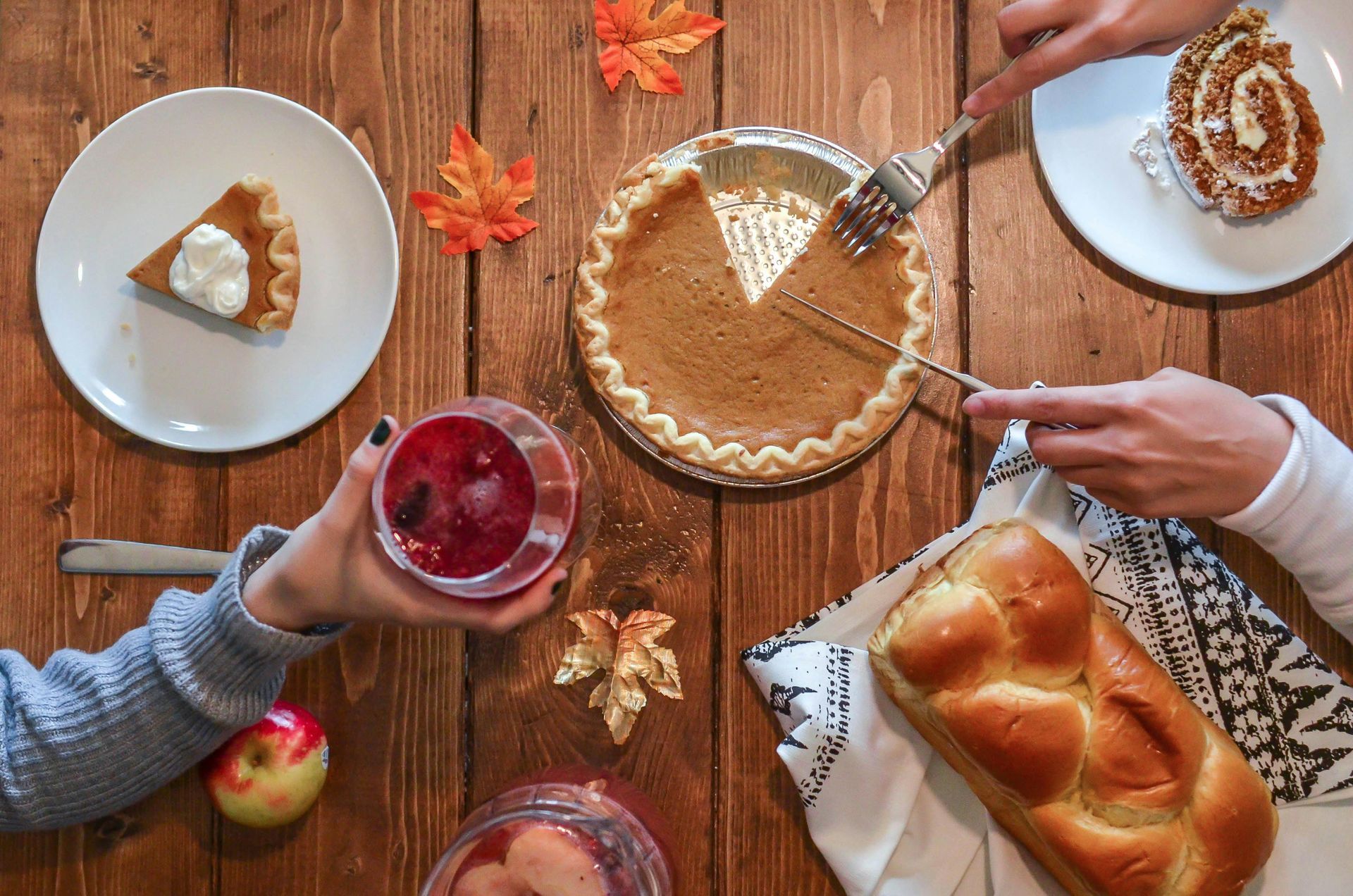(3 min) Managing Thanksgiving as Someone with ADHD or Autism

Thanksgiving is supposed to be all about gratitude, family, and mashed potatoes, but let’s be real: for a lot of neurodivergent folks, it’s a minefield of overwhelm. Between chaotic family gatherings, marathon conversations, endless cooking, and social expectations, Thanksgiving can feel less like a cozy holiday and more like running an emotional triathlon without training.
If you’ve got ADHD or autism, you might approach Thanksgiving differently, but either way, you deserve to enjoy it without burning out. Let’s break it down, ADHD vs. autism style. And let's acknowledge upfront that not ever ADHD brain or individual with Autism thinks, acts, or responds in the same ways... so think of these as general guidelines rather than hard and fast rules!
1. Travel: The Journey Is Not the Destination
ADHD Perspective
Traveling for Thanksgiving is a double-edged sword. On one hand, ADHD brains thrive on novelty... a new environment, a road trip playlist, snacks for the car. On the other, logistics like packing, leaving on time, or sitting still for hours can feel like torture.
Tips for ADHD Travel:
- Make a packing checklist ahead of time and actually use it. Otherwise, hello forgotten charger.
- Break the trip into dopamine hits: audiobooks, car karaoke, pit stops.
- Pack “fidget snacks” like gum or pretzels; something to crunch on keeps restlessness in check.
Autism Perspective
Travel can be a sensory storm: loud airports, cramped cars, unpredictable delays. Even staying overnight at someone else’s house can be destabilizing... new smells, different beds, disrupted routines.
Tips for Autism Travel:
- Bring comfort items (weighted blanket, favourite hoodie, noise-canceling headphones).
- Stick to routines where possible: same bedtime, familiar snacks, a go-to calming activity.
- Create a “safe space” in the new environment, even if it’s just a quiet corner with your headphones.
2. The Meal: Feast or Overload?
ADHD Perspective
Thanksgiving food is dopamine in casserole form. The smells, the flavours, the sheer abundance... it’s exciting. But ADHD impulsivity means you might pile your plate sky-high and crash hard later. Add in endless conversations at the table and you’ve got a recipe for zoning out mid-cranberry-sauce.
Tips for ADHD at the Table:
- Do a food scan before you commit. Pick your favourites first so you don’t get distracted and overstuffed.
- Sit near people you actually enjoy talking to. Small talk is less painful when it’s with a cousin who gets your jokes.
- Have a water bottle handy. Hydration = fewer headaches, less post-turkey crash.
Autism Perspective
Thanksgiving dinner can be overwhelming: textures you don’t like, strong smells, too many people talking over each other. Food rules and sensory sensitivities can make the “just try a bite” pressure feel unbearable.
Tips for Autism at the Table:
- Bring safe foods. It’s not “rude,” it’s survival. No one should force you into sensory distress over stuffing.
- Use smaller gatherings or stagger your eating times if big groups overwhelm you.
- Don’t feel guilty for leaving the table early; you’re allowed to recharge.
3. Family Dynamics: The Real Hunger Games
ADHD Perspective
Thanksgiving conversations can feel like verbal dodgeball. ADHD brains love to jump topics, interrupt with enthusiasm, or lose track mid-story. Cue judgmental looks from relatives who think you’re “too much” or “not listening.”
ADHD Hacks for Family Drama:
- Redirect yourself. If you notice you’re talking over someone, pause and check in.
- Take breaks. Excuse yourself to “check on the pie” when your brain starts buzzing.
- Find your safe person (the sibling, cousin, or partner who “gets it” ) and tag-team tricky interactions.
Autism Perspective
Family gatherings often mean unspoken social rules, small talk Olympics, and confusing non-verbal cues. Add in questions like “Why aren’t you married yet?” or “When are you having kids?” and you might be one meltdown away from hiding in the pantry.
Autism Hacks for Family Drama:
- Script responses in advance for common intrusive questions. Short, polite, done.
- Use stimming tools (rings, fidgets, discreet movements) to self-regulate during conversations.
- Have an exit plan. Even a walk outside can reset your system.
4. Sensory Overload: Lights, Sounds, and Smells
ADHD Perspective
ADHD brains aren’t immune to sensory overwhelm either. Too many people talking, TVs blaring, and kids screaming = instant distraction spiral. You might feel restless, irritable, or desperate to escape.
ADHD Sensory Tips:
- Anchor yourself with grounding techniques (focus on the taste of your drink, the feel of your chair).
- Keep your phone nearby as a mini break zone.
- Volunteer for errands (running to the store or taking the dog out gives you legit alone time).
Autism Perspective
Thanksgiving is practically engineered for sensory overload: clattering dishes, overlapping conversations, food smells, scratchy dress clothes. For autistic brains, it can become unbearable fast.
Autism Sensory Tips:
- Wear what’s comfortable, not what’s expected. No one’s carving you out of your favourite hoodie.
- Noise-canceling headphones or earplugs can be lifesavers.
- Claim quiet spaces early... a spare room, the porch, even sitting in your car for a few minutes.
5. Gratitude Rituals: Meaningful or Awkward?
ADHD Perspective
When someone suggests “let’s go around and share what we’re thankful for,” ADHD brains may panic. You’re either over-talking, under-sharing, or blurting out something awkward.
ADHD Gratitude Strategy:
- Jot a quick note in advance so you’re not caught off guard.
- Keep it short and meaningful, no need for a TED Talk.
- Or, if it’s not your thing, skip it and express gratitude privately later.
Autism Perspective
Group gratitude rituals can feel performative and uncomfortable. Expressing feelings on command may not come naturally, and that’s okay.
Autism Gratitude Strategy:
- Share in writing (a text, card, or note works just as well).
- Stick to concrete thanks: “I appreciate the pumpkin pie” is just as valid as “I’m grateful for family.”
- Opt out politely. Participation isn’t mandatory.
6. Alternatives to the Traditional Thanksgiving
You don’t have to do the “big meal, big family” version of Thanksgiving if it doesn’t work for you. Both ADHD and autistic brains can thrive with alternatives:
- Friendsgiving: Smaller, chosen-family gathering = less drama.
- Solo Celebration: Make your favourite meal, watch a movie, revel in quiet.
- Themed Activities: Gratitude journaling, board games, or even volunteering.
- Food Swaps: If traditional Thanksgiving foods don’t work, pick a different menu entirely. Tacosgiving? Why not.
Thanksgiving can be joyful, chaotic, stressful, or all three at once. If you’re neurodivergent, you don’t owe anyone the “perfect” holiday performance. ADHD brains might need novelty, fun, and structure; autistic brains might need routine, comfort, and sensory control. Both deserve a Thanksgiving that honours their needs.
So here’s the rule: tailor the day to you. Whether that means sneaking pie before dinner, eating chicken nuggets instead of turkey, or skipping the gathering altogether, it’s valid. Gratitude is not about performing tradition — it’s about creating space where you feel safe, comfortable, and authentically you.
Because the real Thanksgiving horror story? Ignoring your needs to keep everyone else happy.


